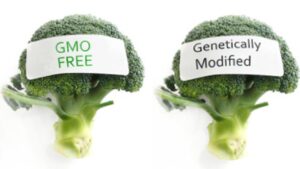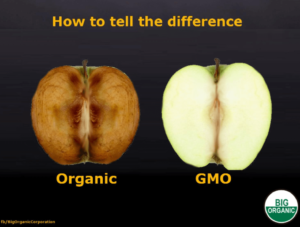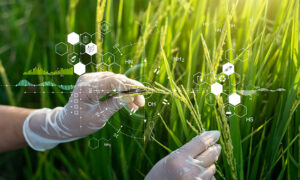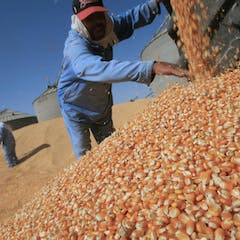By William Sarpong, Managing Editor for Environmental Guide

Since the introduction of genetically modified (GM) Crops, it has generated so much controversy. This controversy has been fueled by people’s imagination, hearsay or myths as to whether it is based on science or otherwise.
The clarification coming from scientists who have developed GM products, per their scientific research, is that there is nothing wrong with the modern technology. Scientists see the brouhaha on the GM as a myth or hearsay because it is new in the system and, it would take time and education for people to understand because change does not come overnight, it takes time.

It is a known fact that climate change is seriously affecting every nation all over the world hence, the need for countries to change their way of doing things and embrace technology to solve their problems. Climate change has affected the agriculture system across the globe to the extent that, lands have lost their fertility, contributing to hunger everywhere. Climate change disrupts food availability, reduces access to food, and affects food quality.

Agriculture is very sensitive to weather and climate and relies heavily on land, water, and other natural resources that climate affects. Climate changes such as temperature, precipitation, and frost timing could lengthen the growing season or allow different crops to be grown in some regions.

This has, therefore, pushed scientists to look for alternative ways of ensuring food security for the world’s population and have developed GM Crops to ensure food security.
Meanwhile, the survival of mankind depends largely on agriculture and is becoming obvious that the only hope to solve food security worldwide, is to embrace biotechnology.
The question to ask is, what further interrogation have those against the new technology done to verify the health effects on mankind and the environment.

Have they considered the social economic benefits to be derived from GM as far as food security is concerned?
A genuine challenge as far as the negative perception of GM is that, because it is a new invention, not much is known about its long-term effects on human beings.
Those against GM are of the view that, because much information about the health effects of the invention is not known, it would be safe to stay away from GM foods. It is up to developers to provide more information about GM foods to erode any fear or doubt.

Some of the negative comments, myths and misconceptions people make about GM are that, GM foods can be harmful to the human body.
They also have the notion that genetically engineered crops can cause the development of diseases which are immune to antibiotics. Many religious and cultural communities who are against GM crops see it as an unnatural way of producing foods. Others are also not comfortable with the idea of transferring animal genes into plants and vice versa with the belief that this can cause damage to other organisms that thrive in the environment.
Some believe that, with the increase of GM crops, developing countries would start depending more on already industrialized countries because it is likely that crops would be controlled by them in the near future. However, for countries to ensure food security for their citizens at the time climate change is putting serious pressure on them especially, the developing nations, the inputs of scientists cannot be overlooked.

The impression I had from a sensitization workshop organized by the Open Forum on Agricultural Biotechnology (OFAB) Ghana on agricultural biotechnology, was a clear indication that, scientists are doing everything possible to ensure that food security is assured through GM Crops.
GM Crops are said to have their DNA altered by scientists to create desired traits for human benefits. It is a technology that involves inserting DNA into the genome of an organism. To produce a GM plant, new DNA is transferred into plant cells. The cells are then grown in tissue culture where they develop into plants. The seeds produced by these plants inherit the new DNA.
The scientists at the forum made it clear that, the characteristics of all living organisms are determined by their genetic makeup and their interaction with the environment.

Again, the genetic makeup of an organism is its genome, which in all plants and animals is made of DNA. The genome contains genes, regions of DNA that usually carry the instructions for making proteins and it is these proteins that give the plant its characteristics.
Genetic modification of plants is said to involve adding a specific stretch of DNA into the plant’s genome, giving it new or different characteristics.
This could include changing the way the plant grows or making it resistant to a particular disease. The new DNA becomes part of the GM plant’s genome which the seeds produced by these plants contain.

A report in 2016 from the National Academies of Sciences, Engineering and Medicine suggests that there is scientific consensus that GM crops and foods are safe.
The analysis gathered from scientists at the forum point to the fact that breeders who develop plants using genetic modification do so to improve resistance, nutritional content, and resilience to environmental stress.
It came to light that, GM technology has become necessary to the current dispensation due to challenges such as lack of nutrients rich foods, drought, floods, human – pest conflicts which cause less production, income and increased poverty, unable to produce the food needs of the growing population as well as combating some diseases and challenges of plants and animals in terms of time and cost.

Again, GM foods have become necessary as a result of the decreasing agricultural lands at a fast rate due to competition from other land users.
Furthermore, GM is now needed due to inadequate financial resources and low returns, and the declining soil fertility at an unprecedented rate such that replenishing the soil at the expected rate is almost a new area of focus.
Other factors to consider in GM technology have to do with the changes in climate, environmental conditions, food situation, population growth, crop quality, and yields.

According to scientists at the workshop, increasing farmers’ income is another important reason for the adoption of GM Crops because farm income is one of the critical motivations in farming.
Also, quality and high-yielding seeds, bring good harvests hence, increased farm income.
Biotech is said to be used to produce crop varieties that can thrive under harsh conditions to enable farmers to produce in harsh environmental or pest invasion conditions.

GM Crops according to scientists, poses no known risk to the environment but rather, it is known to significantly reduce agriculture’s impact on the environment.

It provides targeted pest control methods that reduce impacts on non-target species and therefore reducing the need to use chemicals on the farms. Likewise, it provides greater resistance against viruses and other diseases, which results in less waste and increased food security.
Also, some GM crops have greater tolerance to herbicides, making it easier for farmers to control weeds.

Some GM crops have been developed to thrive in a harsh climate, such as drought or grow in salty soils.
Other benefits of GM crops as elaborated during the workshop are the development of food products to confer nutritional benefits, the development of food products to produce fewer or no allergens, development of fruits and vegetables to produce higher levels of nutrients.

One can, however, conclude that, based on the in-depth knowledge given by the scientists about GM at the workshop, it is obvious that, agricultural biotechnology is one of the ways to combat food security.
GM can be used to address factors that cannot be solved by conventional breeding means to boost agriculture.

Biotechnology has the power to improve human health, environmental sustainability and the well-being of consumers and farming communities.
It is said that, most of the DNA in food — whether GMO or not — either is destroyed by cooking or breaks down before it reaches the large intestine.

Meanwhile, research so far has not yet shown that GMO foods are harmful to human health.


